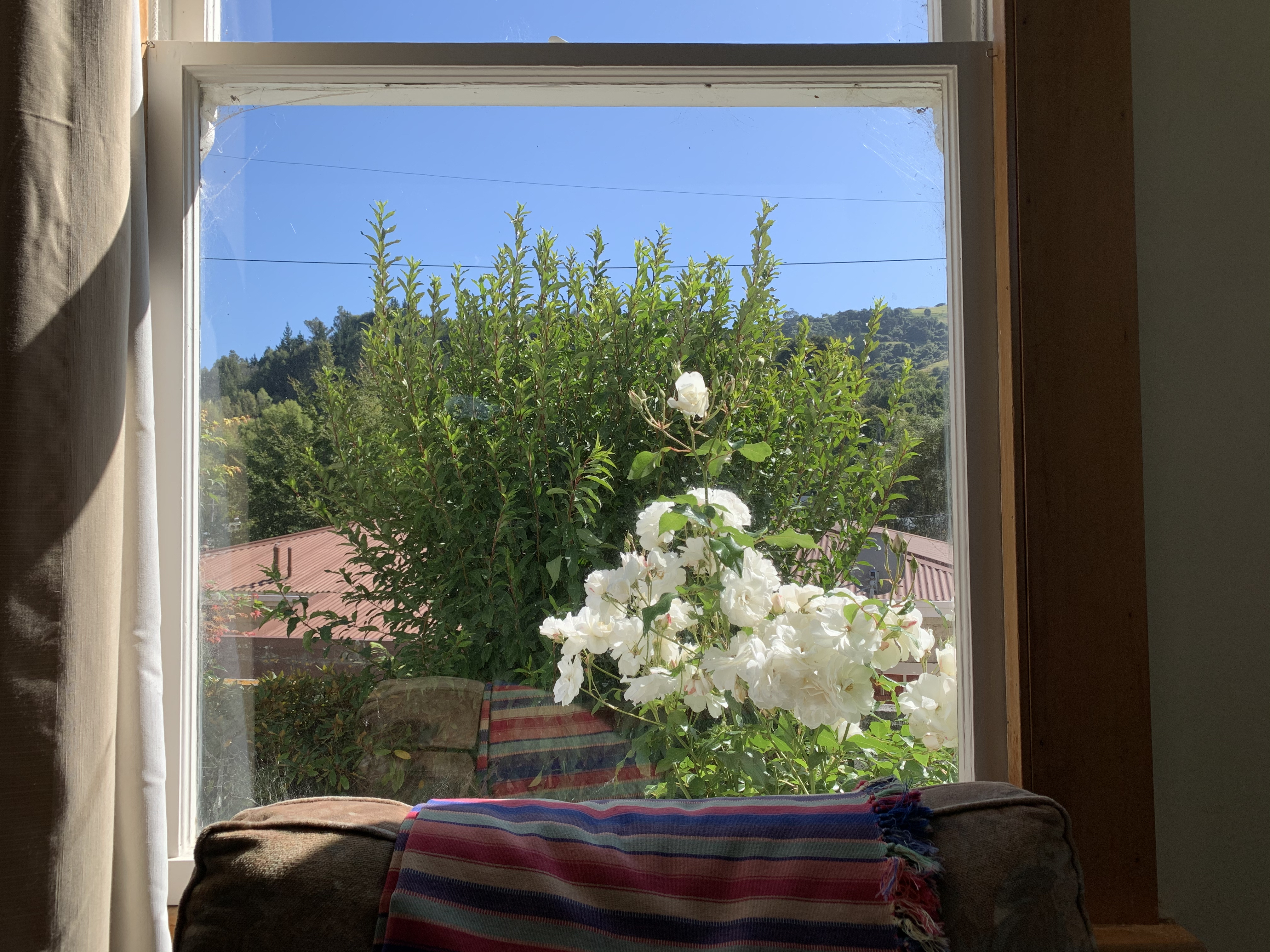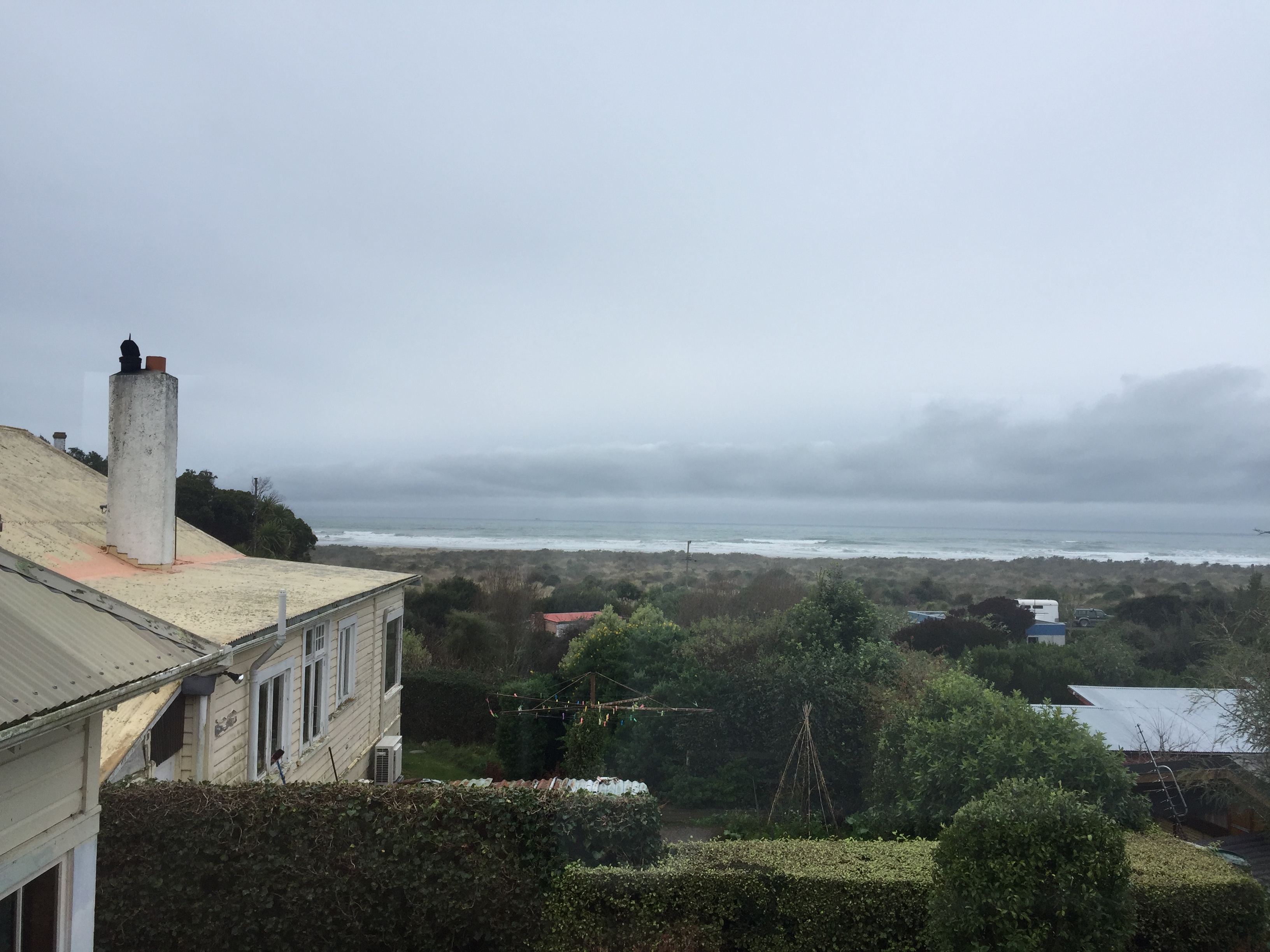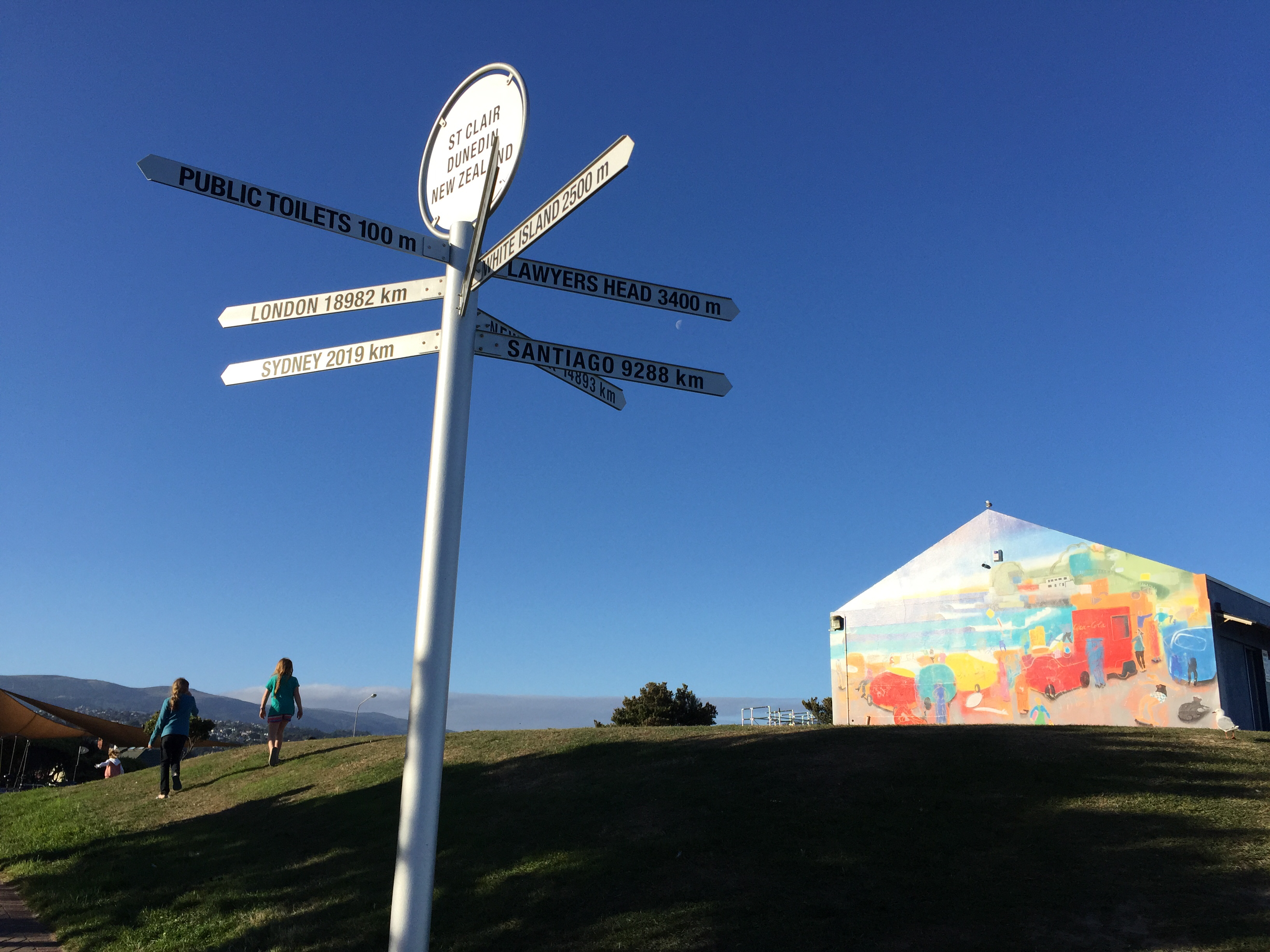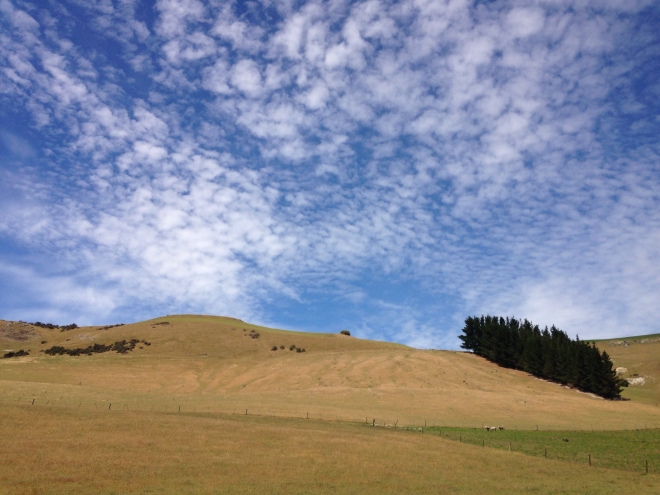
We drove over to the other side of the harbour on New Year’s Day, to spend the day with my sister and her family. This was the view from the side of the road on our way home at dinner time, the sun heading down towards the sea, the wild grass beginning to pink. I never get tired of this drive, the way the narrow roads curve up along the ridge of the Awhitu Peninsula. One side looks back towards the city, and the other, over undulating hills and hidden valleys, towards the ocean.
It’s sad the hills are barren, in one sense. And yet there’s something sensual about their naked curves. I want to run my hands over them, smooth them out and bunch them up again, like a child with playdough. If you look carefully you get a glance at a small lake in the flat land between the hills, a glinting sheet of glass in the sun, a second later it’s gone. Earlier, at the beginning of the road, there’s a small old wooden church that commands a view not unlike the one you see above. It’s an unused church, religiously speaking, and yet it is iconic and beloved. A church with a view.
I like the days around New Year’s. They command a view. A view back to the year that has gone, and a view forward into our dreams. Oh how we wonder how the next year of days will turn. What surprises, what successes, what dreams come true, what longings, what pain will surface in the next three hundred and sixty five days? The days will go fast, we know that for sure. They will tumble away behind us and we won’t be able to do anything about it. Except let them go.
I let 2012 go on Monday night, at midnight, when the crackle of unseen fireworks burst into the quiet night. I didn’t even try to hold on. 2012 was a complicated year, the hardest I’ve lived; emotionally, relationally and spiritually. I wouldn’t wish that year on myself again. And yet I couldn’t have got to 2013 without it. In fact, I couldn’t have got to the rest of my life without it. 2012 was the doorway to my life.
Catholic writer Richard Rohr talks about doorways and transitions as “liminal space”, a space that is “thin” in the Celtic sense, closer to the unseen realm. The term “liminal space” is not new, but its more deeper, spiritual sense has been best articulated by Rohr. The term comes from the latin limen meaning threshold and in this article “On the Edge of the Inside” Rohr notes that the tradition of having guardians and spirits of “doors, bridges, exits and entrance ways” can be noted across cultures and throughout history. He points out that “the ancients knew that you need guidance, patronage, and protection as you move from one place or state to another.”
The concept of liminal space has resonated with me since I first heard it, and I’ve come to understand it as a space or time of transition, often where things feel difficult, where life is not unfolding in a predictable or easily understood manner, and where perhaps it feels as if there is pressure on all sides, not unlike the pressure a newborn experiences as she is propelled through the birth canal. I said to a friend once that being pregnant is the ultimate liminal space, because it is nine months of transition, nine months of waiting for a new life to arrive, nine months of preparing to be transformed into the mother of the new life, with no escape route. In a way, pregnancy is double liminal space. The gestation and the giving birth to new life is one form, and the gestation of the mother herself, as she waits to be born, as she waits to be transformed into motherhood, is the other. She is both the carrier of life and the growing life herself.
I thought about this over Christmas. I had a card with a reproduction of “The Visitation” by James B Janknegt as part of our nativity scene, thanks to World Vision’s Advent in Art series. The painting shows Mary and her cousin Elizabeth greeting each other, and the babies leaping in their wombs in recognition of each other. The picture is like an animated version of an ultrasound, but with a slight difference: the babies are depicted as their adult selves, Jesus with a crown, and John falling to his knees in worship, the present and the future rolled into one.
If I was pregnant in 2012, it was a rough pregnancy. The symptoms surprised, and the growth didn’t happen in an orderly, expected fashion. What’s more, it was a funny sort of pregnancy, not one that was plainly seen by the bulging of a belly. It was all on the inside. And if I was pregnant, I gave birth to myself, which means I had that double liminal space thing going on. I was pregnant with myself. I grew heavy, weary, sick of the challenges and the complications, tired of the continual necessity for introspection and self-revelation. It was hard work. The growing was hard work too. And it’s not very pleasant to be forced under enormous pressure through a narrow canal, as if your life depended on it. But I’m out.
I’ve spent most of my life trying to find my life. I’ve tried, and failed, at plenty of things other than the two things I know I was born for; my family, and my words. Even once I finally figured out that all I really wanted to do was write, I still did things the hard way. Always searching, always striving for the key that would unlock my “perfect” writing life. I was convinced that if I could just get the help I needed, or just wake up at five every morning, or just do the research I thought would answer all my doubts, that I’d be away, laughing. If I’d been right, I would have written several novels by now. In fact if you’d told me, at twenty-two, that I’d be approaching forty with no novels to show for it, I’d have been aghast. I simply wouldn’t have believed you.
I took the dog for a walk through our bush this afternoon. I found myself throwing a few words up at God, as I often do when I walk. I apologised for being useless at everything from being disciplined with food, to being disciplined with my art. It wasn’t overly dramatic or anything, just what naturally came out as I let the words rise. As soon as I’d said it, I looked up. There in the trees above me was a tui, one of my favourite birds. These beauties have a gorgeous green glint in their dark feathers, a beautiful white bell at their throats, and a trill of a call that is haunting. I smile when I see a tui in our bush, because it feels like such a luxury to have them so close, to be their neighbours. And as I looked up at this tui, I reallised. The tui doesn’t have to do anything to be beautiful. The tui just is. The tui is beautiful because he is tui.
Can I believe that about myself? Can I believe that I am beautiful, that my life has meaning, just because I am? And that the words I’m longing to write will come, not by some forced effort of will, but by the simple act of being. I am beautiful because I am. I will write because I am Idoya. The question came to me then, what would my name look like as a verb? What would it mean to Idoya. What would my life look like if it was filled with the simple act of Idoya-ing.
What would your name look like as a verb? What would it mean to Patrick, or to Hilary, to Joy, to Daniel, to Esme, to Carey, to Glen or to Allie? What does Melanie-ing look like? Or Heidi-ing? It sounds silly, I know, but it makes sense. What would a life devoted to the art of Jayraj-ing look like? Anita-ing? Leonie-ing? A life full of being Amy? What if your whole life’s work and purpose and joy was summed up in your name, in the essence of you. Could it really be that simple?
I think it is that simple, and yet, as 2012 has taught me, it’s not simple at all. To live a life devoted to the art of being you, you have to first know who you are. To be yourself, you have to know yourself. You might have to be born, as yourself. Stranger still, you might even need to give birth to yourself. And there’s that double liminal space.
Liminal space is sacred. It’s a time and space that requires things of us that ordinary life doesn’t. It’s lonely on the edge, and transitions can be confusing. There are pressures, complications, challenges to be met, sacrifices to be made, internal depths to scour. We need all the help we can get, other-worldly and otherwise. And yet it is a gift. In the way of mountain ranges and peninsulas, tunnels, valleys and canyons, it commands a view. The view might not come at the beginning, and sometimes you might wonder if the view’s going to come at all, and yet it comes. And there are angels and hidden lakes and small churches, and other pilgrims – bellies bursting with life like yours – just when you need them.
 the view from where I was sitting
the view from where I was sitting  Warrington, Monday 16th July
Warrington, Monday 16th July



